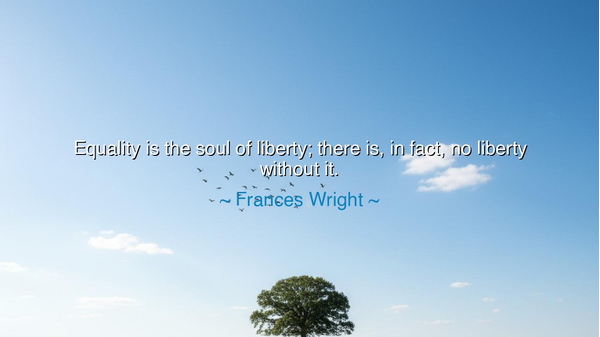
Equality is the soul of liberty; there is, in fact, no liberty






The words of Frances Wright—“Equality is the soul of liberty; there is, in fact, no liberty without it.”—resound through the centuries like a bell tolling for truth. They rise from the depths of human struggle and speak to the eternal bond between freedom and justice. Wright, a woman far ahead of her time, understood that liberty without equality is a hollow promise—a shadow of freedom that serves only the strong. In her eyes, equality was not merely a political concept but the essence of liberty itself, the divine breath that animates it. Without it, liberty becomes privilege; with it, liberty becomes life.
The origin of this quote lies in Wright’s fierce advocacy for human rights during the early nineteenth century. Born in Scotland in 1795, she came to America with the dream of building a society where freedom was not a gift for the few but a right for all. She was among the first women to speak publicly on such matters, denouncing slavery, advocating for women’s education, and calling for economic justice. In her lectures and writings—particularly her 1829 address “Course of Popular Lectures”—she thundered against hypocrisy: how could a nation claim to be free while half its people were enslaved, and the other half, its women, silenced? Thus, her words were both a moral revelation and a challenge to her age.
Wright’s declaration that “equality is the soul of liberty” reveals her vision of freedom not as independence from constraint, but as balance among all souls. To her, liberty without equality is like a body without breath—it exists in form, but not in life. A society that calls itself free while permitting the domination of one class over another, or one gender over another, is but a masquerade of freedom. The master may think himself free, but he is chained to his cruelty; the oppressed may dream of liberty, but without justice, that dream is denied. Thus, Wright saw equality as the moral foundation of all true liberty—a flame that burns not brighter when it consumes others, but when it illuminates all.
History has proven her words again and again. Consider the great abolitionist movement in America, where men and women of conscience fought to end the chains of slavery. They knew, as Wright had declared decades earlier, that a nation could not call itself free while others suffered in bondage. When Abraham Lincoln stood upon the field of Gettysburg and spoke of a “new birth of freedom,” he echoed the same truth: liberty cannot live divided. A society that denies equality to some will, in time, destroy freedom for all. Indeed, the wars and revolutions of history—from the French Revolution to the American Civil Rights Movement—have been fought not merely for independence, but for the deeper justice of equality.
Wright’s words also touch the soul of the individual. Within every heart lies the same principle she proclaimed for nations: that freedom cannot exist without fairness. A person cannot be truly free while despising another, nor can one enslaved by prejudice claim to know liberty. For equality is not only the law of the land—it is the law of the spirit. The one who sees all others as equals walks in peace, while the one who measures worth by rank or wealth lives in quiet bondage to pride. Thus, to live as a free being is to live as a just being, honoring the divine spark that burns equally in all.
And yet, the path Wright illuminated is still not fully walked. Even now, the world wrestles with the same questions she raised two centuries ago. We live in an age of vast progress and yet deep division. Her words remind us that freedom without compassion breeds inequality, and that progress without justice breeds tyranny in new forms. True liberty requires vigilance—not against foreign powers, but against the ancient enemy of arrogance that whispers, “My freedom is greater than yours.” In resisting that voice, we honor both Wright and the countless souls who struggled for the right to stand equal under the sun.
The lesson, then, is as clear as it is eternal: if you wish to preserve freedom, guard equality with all your strength. Speak for those whose voices are unheard, act where injustice lingers, and remember that no liberty is safe unless it belongs to all. Begin in your own life—treat others not as lesser or greater, but as companions in the same great human voyage. Teach your children that worth lies not in power, but in respect. For every time you defend another’s dignity, you defend your own.
And so, let the words of Frances Wright be written upon the hearts of all who seek wisdom: “Equality is the soul of liberty; there is, in fact, no liberty without it.” For when equality reigns, liberty becomes complete; when it falters, liberty fades. A nation that cherishes both will stand unshaken, and a soul that lives by both will know peace. Thus, the voice of Wright, though born of centuries past, speaks still to our age—calling us not merely to freedom, but to the higher calling of justice, compassion, and unity.






AAdministratorAdministrator
Welcome, honored guests. Please leave a comment, we will respond soon